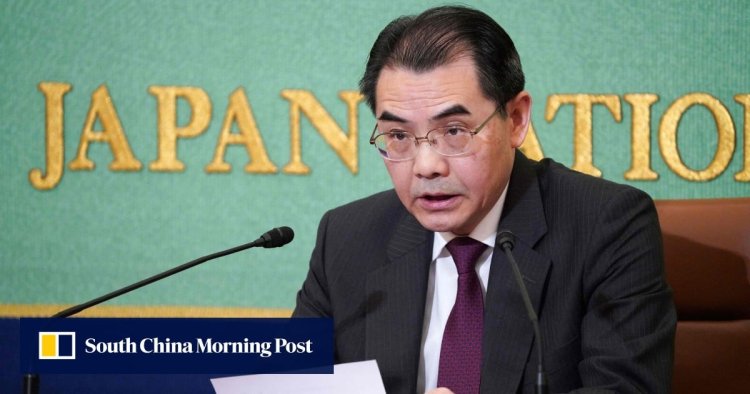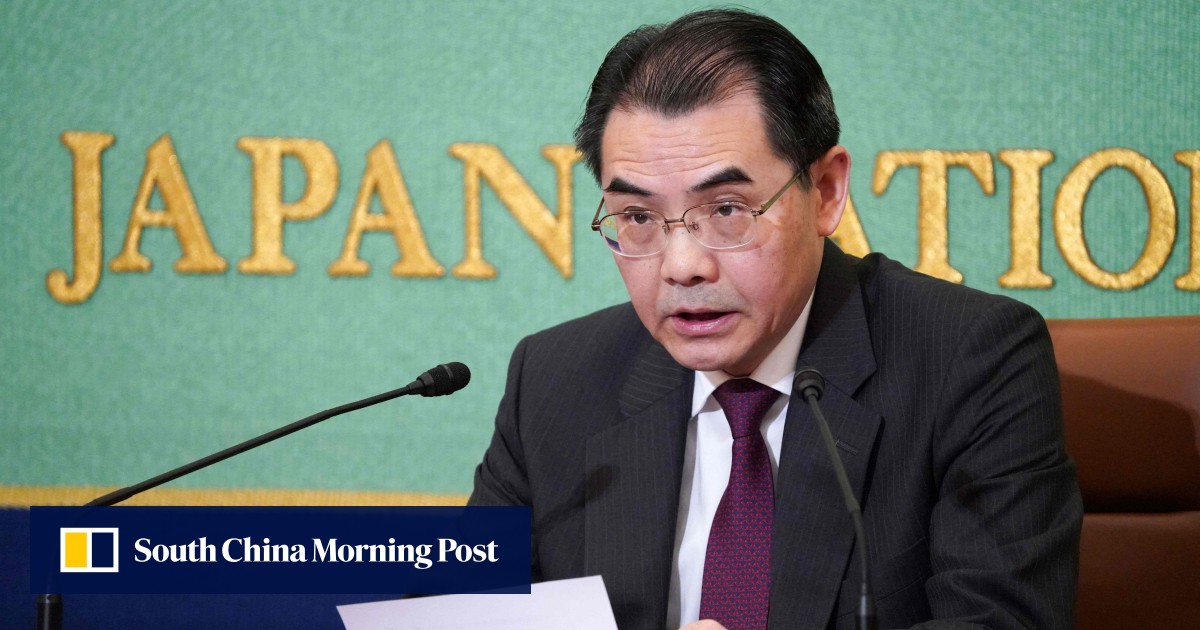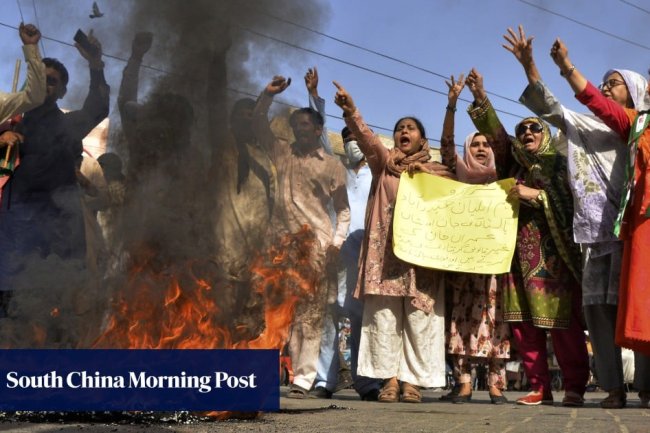Chinese envoy warns Japan on Taiwan ‘red line’, links Japanese man’s detention to spying
2023.04.29 19:28China’s new envoy to Tokyo urged Japan not to link its own security to tensions across the Taiwan Strait, and said the detention in Beijing of an employee of Japanese drug maker Astellas Pharma was an espionage case.During a speech at the Japan National Press Club, Chinese ambassador Wu Jianghao also singled out the US as the biggest hurdle to improving the fraught ties between the Asian neighbours, which he said stood “at a critical crossroads”.Wu, 59, is a former assistant foreign minister. He took up his post in Tokyo last month, at a time when bilateral ties have shown signs of further deterioration despite Japanese Foreign Minister Yoshimasa Hayashi’s recent Beijing visit.The Taiwan issue is a red line that must not be crossed, Wu said, as he slammed Tokyo’s assertion – promoted by the late former Japanese prime minister Shinzo Abe – that any contingency in Taiwan would amount to a contingency for Japan as “absurd and dangerous”.“It is illogical and harmful to conn


China’s new envoy to Tokyo urged Japan not to link its own security to tensions across the Taiwan Strait, and said the detention in Beijing of an employee of Japanese drug maker Astellas Pharma was an espionage case.
During a speech at the Japan National Press Club, Chinese ambassador Wu Jianghao also singled out the US as the biggest hurdle to improving the fraught ties between the Asian neighbours, which he said stood “at a critical crossroads”.
Wu, 59, is a former assistant foreign minister. He took up his post in Tokyo last month, at a time when bilateral ties have shown signs of further deterioration despite Japanese Foreign Minister Yoshimasa Hayashi’s recent Beijing visit.
The Taiwan issue is a red line that must not be crossed, Wu said, as he slammed Tokyo’s assertion – promoted by the late former Japanese prime minister Shinzo Abe – that any contingency in Taiwan would amount to a contingency for Japan as “absurd and dangerous”.
“It is illogical and harmful to connect a matter that is purely China’s internal affairs to Japanese security,” he said, according to an official readout on the embassy’s website.
“If Japan is tied to secessionist forces that seek to split China, the Japanese people will be dragged into the fire.”
Noting concerns and “misunderstanding among some Japanese friends” about Beijing’s refusal to renounce the use of force on Taiwan, Wu described the stance as “a fundamental deterrent” to repeated, “salami-slicing” provocations by the island’s secessionist forces and their foreign supporters.
“It is a fundamental guarantee for maintaining peace and stability across the Taiwan Strait,” he said.
Asked about China’s detention last month of a Japanese employee of Astellas Pharma, which further soured bilateral ties, Wu said it was not a case of an innocent Japanese citizen being taken into custody.
“This is a case of espionage involving China’s national security and the evidence is becoming more and more conclusive,” he said.
Japan lodged an official protest demanding the release of the Astellas employee, a man in his 50s who has yet to be identified. He has lived in China for two decades.
Hayashi, who visited Beijing early this month, raised the issue during meetings with Chinese officials including his counterpart Qin Gang and China’s top diplomat and former ambassador to Japan, Wang Yi.
According to the Japanese foreign ministry, Hayashi told Chinese Premier Li Qiang that it was “extremely important for the Chinese government to ensure an environment in which Japanese nationals and Japanese companies can conduct activities with a sense of security in China.”
Wu dismissed rampant criticism of China’s handling of similar espionage cases, which the US and its allies have described as arbitrary detentions of foreign nationals for political reasons.
“It is the Japanese individuals or organisations who instructed these people to engage in espionage activities in China that should reflect [on this] and restrain themselves,” he said.
Spying activities in China would be dealt with firmly in accordance with the law, he added.
Wu also accused the Japanese media of fuelling fears about China.
“Some even say that in China you can get arrested if you walk down the street, [for] taking photographs, or talking to friends,” he said.
Denying this was the case, Wu said anyone conducting normal friendship or business activities would be welcomed with open arms, according to Bloomberg.
The scope of China’s anti-espionage law is set to be widened in July, its first update since being passed in 2014.
Seventeen Japanese nationals have been detained in China since 2015, an official from Tokyo’s foreign ministry was quoted as saying by Bloomberg earlier this month. Five are still in Chinese custody, of whom two have received sentences.
China to amend anti-espionage law to cover cyberattacks by spy ‘surrogates’
Brushing off concerns in Tokyo, Washington and other Western capitals about China’s repressive policies at home and increasing assertiveness abroad, Wu insisted China had never treated Japan as “a rival, let alone a threat or even an enemy”.
He noted that Japanese animation films, such as The First Slam Dunk and Suzume, were even more popular in China than in Japan, and said the two countries should seize the post-Covid era as an opportunity to promote exchanges, especially among youth.
“Regrettably, the Japanese side has openly positioned China as the ‘greatest strategic challenge ever’, followed the lead of other countries in opposing and curbing China, exaggerated the ‘China threat’ and accelerated the pace of armament expansion,” he said.
Wu’s outlook was grim on prospects for bilateral ties, and he was particularly blunt when examining Japan’s strategic pivot to the US against China.
“China-Japan relations are now at a critical crossroads, facing the most complex situation since the normalisation of diplomatic relations, and encountering new problems, risks and challenges that have never been encountered before.
“The US has been smearing China and exerting extreme pressure on it, and it has also coerced other countries to encircle and contain China’s development, making it the biggest external challenge to Sino-Japanese relations.”
With its own US ties trapped in the worst downward spiral, Beijing has in recent months grown increasingly vocal in its criticism of Tokyo’s close military and political alignment with Washington over Taiwan, and in the East and South China seas.
In keeping with Beijing’s line on dealing with US allies, Wu urged Tokyo to maintain “strategic autonomy”, distance itself from Washington and establish “a correct perception” of China.
Japan approves defence pacts with Australia, Britain
He was particularly critical of Tokyo’s decision to follow the US in curbing the export of semiconductor manufacturing equipment to China, as part of US-led efforts to hobble Chinese ability to make advanced chips.
Japan should learn the lessons of the past, from its “unreasonable and cruel economic suppression” by the US in the late 1980s, and refrain from targeting China in its attempts to decouple economies or sever supply chains, Wu said.
“China will carefully assess the actual impact of the Japanese policy and will not sit back and watch its interests suffer for no good reason. We do not want to see a situation where China and Japan both lose, while a certain country rejoices.”
What's Your Reaction?

















